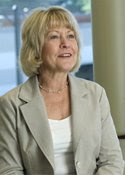Monday, October 20, 2008
I was surprised to learn the term pre-conception care from Sarah Brown, co-founder of the National Campaign. When I was 26 and wanting to get pregnant with my first child, it never occurred to me to prepare myself physically like an athlete getting ready to run a marathon. I knew I needed to get prenatal care after I got pregnant: take a few vitamins and get monthly checkups. But thinking about whether I was healthy enough to bear a healthy child? It never occurred to me. I seemed healthy. I didn’t even have a doctor when I got married. The clinic where I got my birth control pills was my only healthcare. Sarah is right. Women who lack immunizations, have issues of alcoholism, drugs, obesity, or who have chronic diseases like diabetes, might have trouble birthing a healthy baby or might endanger her own health without pre-conception care. Having a health issue doesn’t mean a woman can’t give birth to a healthy baby, but it means women must be taught to plan and prepare for pregnancy; it shouldn’t take her by surprise.
We Plan What We're Having For Dinner, But Not Pregnancy?
We recently had Sarah Brown, CEO of the National Campaign to Prevent Teenage Pregnancy and Unplanned Pregnancy, here in Des Moines to continue our conversation about reducing the number of unintended pregnancies among adult women in Iowa. She visited with family planning service providers from around the state, legislators, journalists and professionals connected with this issue.
Sarah says Americans plan everything: household budgets, vacations, what we’re having for dinner. She quoted a New York Times article that mentions the increase in wedding planners in the U.S. Yet we don’t plan pregnancies. Even though giving birth and having children is one of our most important acts, with a permanent impact on our lives, we don’t discuss the decision with partners or plan individually (especially 20 year-olds). Too many sexually active people don’t think about the consequences an unintended pregnancy might have on income, education, time or energy.
Sarah encourages parents and caring adults to include talking about the planning pregnancy along with the other issues we encourage young people to consider as they reach adulthood. This includes talking with family planning professionals about choosing a birth control method that meets each couple’s needs.
Sarah says Americans plan everything: household budgets, vacations, what we’re having for dinner. She quoted a New York Times article that mentions the increase in wedding planners in the U.S. Yet we don’t plan pregnancies. Even though giving birth and having children is one of our most important acts, with a permanent impact on our lives, we don’t discuss the decision with partners or plan individually (especially 20 year-olds). Too many sexually active people don’t think about the consequences an unintended pregnancy might have on income, education, time or energy.
Sarah encourages parents and caring adults to include talking about the planning pregnancy along with the other issues we encourage young people to consider as they reach adulthood. This includes talking with family planning professionals about choosing a birth control method that meets each couple’s needs.
Wednesday, October 8, 2008
Reading on the beach...
The beach is the perfect place to read The Lolita Effect. Toddlers are dressed in bikinis and tweens are promenading in bathing suits that leave little to the imagination—this on a beach that is advertised as the most family-oriented beach in the U.S. Two little girls practice a move that involves jutting out a hip and several pelvic thrusts. This is my backdrop for a book authored by Gigi Durham, a journalism professor at the University of Iowa. She contends that the media in cahoots with big business is creating a health crisis for the world’s young women that affects teenagers in the suburbs of Minneapolis, 11 year-old prostitutes in Bangladesh and college co-eds worldwide. She stresses that each young woman has a right to make decisions about her own sexuality, to learn to define what is best for her as she grows older and matures.
Durham says that young women today are learning how to be sexual from the media, which is trying to sell products without regard for the best interests of young women. She says if parents and health educators don’t talk to children about sexuality that the ads, movies, musicians, and the Internet will fill the void. I like this book for its practical approach. Durham tells parents, grandparents, teachers and other caring adults what they can do to generate conversation with young men and women to help them learn to be critical consumers of the media. It’s also a blueprint for how adults can initiate a public conversation with decision-makers at the local level.
Durham says that young women today are learning how to be sexual from the media, which is trying to sell products without regard for the best interests of young women. She says if parents and health educators don’t talk to children about sexuality that the ads, movies, musicians, and the Internet will fill the void. I like this book for its practical approach. Durham tells parents, grandparents, teachers and other caring adults what they can do to generate conversation with young men and women to help them learn to be critical consumers of the media. It’s also a blueprint for how adults can initiate a public conversation with decision-makers at the local level.
Subscribe to:
Posts (Atom)




